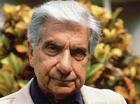
Augusto Roa Bastos (Asunción, Paraguay, June 13, 1917 - Asunción, Paraguay, April 26, 2005). Narrator and poet, he is considered the most important Paraguayan writer of the twentieth century and one of the great novelists of Latin American literature.
His childhood was spent in Iturbe -a small culturally Guarani town-, the scene and almost constant referential object of his novelistic world. He participates in the Chaco War between his country and Bolivia, an experience that he takes advantage of for his novel Hijo de hombre (1960), a work that covers one hundred years of Paraguayan history. It is noteworthy the technical rigor with which the author traces his story, as well as the strength of the mestizo prose with which he transcribes regional speech.
Opposed to the dictatorial regime of his country, he almost always lives abroad (especially in Buenos Aires) and works as a journalist, lecturer and teacher.
His books include several collections of short stories: El trueno entre las hojas (1953), El baldío (1966), Madera quemada (1967), Los pies sobre el agua (1967), Moriencia (1969) and Cuerpo presente (1971). His most relevant work is the novel Yo, el supremo (1974), inspired by the life of the former dictator of Paraguay between 1814 and 1840. In it he delves into the roots of Paraguayan Spanish, promoting the creation of neologisms, deformations and continuous games both lexical and syntactic.
In addition to writing several film scripts, other works are El pollito de fuego (1974), Lucha hasta el alba (1979), La vigilia del almirante (1992), El fiscal (1993), Contravida (1995) and Madame Sui (1995).
In 1989 he obtained the Cervantes Prize and, the following year, the National Order of Merit of Paraguay.







